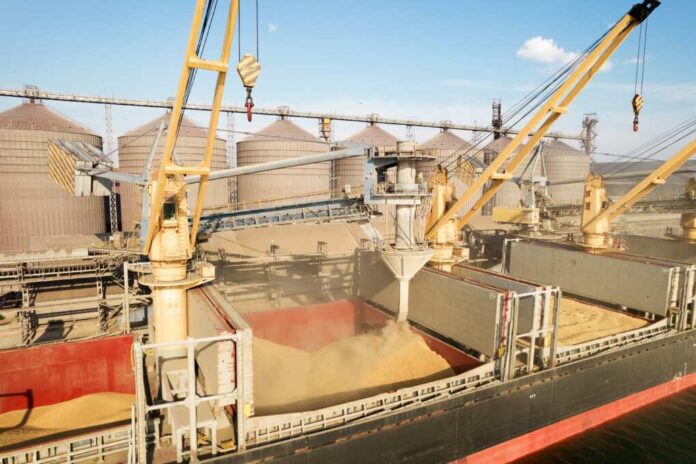
The war in Ukraine continues to put unpredictable stress on the global market for agricultural products. The latest problems affecting trade are particularly impacting the Black Sea region, a crucial conduit for exports used to feed much of the world.
The complex situation intensified on Wednesday when a Panama-flagged bulk carrier, the “VYSSOS”, on its way to take on a full load of grain at the Danube River port, reportedly struck a Russian mine. Ukraine’s southern military command reported: “A Panama-flagged civilian vessel was blown up on an enemy sea mine in the Black Sea. The vessel lost its course and control, and a fire broke out on the upper deck.”
The VYSSOS, currently operated by a Greek shipping company, is now reportedly beached near the Danube Delta Biosphere Reserve to prevent it from sinking completely after being damaged. Despite the severe risks, commercial vessels continue to traverse the Black Sea. The critical route for Ukrainian grain exports is being challenged by the Russian defense ministry’s declaration that it will now consider all cargo ships bound for Ukraine as military targets.
Wheat Rises As Grain Ship In Black Sea Hit By Mine https://t.co/P7VyAbrvkR
— zerohedge (@zerohedge) December 29, 2023
This incident has had immediate economic repercussions. Wheat prices in Chicago saw a rise of about 2.5% following the event. Matt Zeller, a senior market analyst at StoneX Financial Inc., observed, “Wheat is finding at least a bit of support again this morning on more action in the Black Sea.” The increase in wheat prices reflects the market’s sensitivity to disruptions in grain shipments from Ukraine, often dubbed the “breadbasket of Europe.”
The broader context of this event is Russia’s increasing attacks on Ukraine’s port infrastructure, especially after Moscow withdrew from a UN-brokered deal ensuring the safe passage of Ukrainian grain shipments via the Black Sea. In response, Kyiv established an alternative route along the western shores of the Black Sea, though Russian forces have reportedly been dropping explosive devices in its vicinity.
This week’s mining explosion is not isolated. The Black Sea has witnessed several such episodes involving civilian vessels. The recent mine explosion injured two crew members, including a captain and an Egyptian sailor. The diverse crew of 18, comprising Egyptians, Ukrainians, and Turkish citizens, exemplifies the multinational nature of these shipping operations and the widespread impact of such incidents.
As the ongoing war continues to take a heavy toll on commerce, Ukraine has been working to bolster its financial resources by leveraging its agricultural exports. The vigilance in using the Black Sea shipping corridor is key to Ukraine’s resilience in the face of the Russian invasion and its ability to maintain some standard of economic stability.














